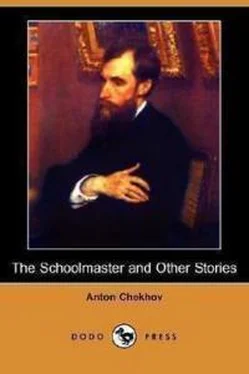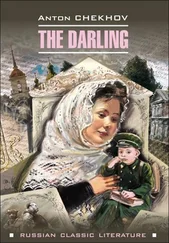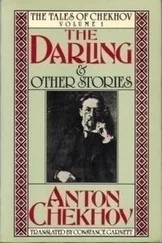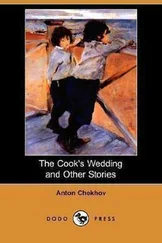"'I haven't long to live now, nurse,' she would say. 'As soon as my confinement is over I shall die. I did not want to die so early, but it seems it's my fate.'
"The nurse and the cook were in tears, of course. Sometimes the priest's wife or some lady from a neighbouring estate would come and see her and she would take them aside and open her soul to them, always harping on the same subject, her approaching death. She spoke gravely with an unpleasant smile, even with an angry face which would not allow any contradiction. She had been smart and fashionable in her dress, but now in view of her approaching death she became slovenly; she did not read, she did not laugh, she did not dream aloud. What was more she drove with her aunt to the cemetery and selected a spot for her tomb. Five days before her confinement she made her will. And all this, bear in mind, was done in the best of health, without the faintest hint of illness or danger. A confinement is a difficult affair and sometimes fatal, but in the case of which I am telling you every indication was favourable, and there was absolutely nothing to be afraid of. Her husband was sick of the whole business at last. He lost his temper one day at dinner and asked her:
"'Listen, Natasha, when is there going to be an end of this silliness?'
"'It's not silliness, I am in earnest.'
"'Nonsense, I advise you to give over being silly that you may not feel ashamed of it afterwards.'
"Well, the confinement came. The husband got the very best midwife from the town. It was his wife's first confinement, but it could not have gone better. When it was all over she asked to look at her baby. She looked at it and said:
"'Well, now I can die.'
"She said good–bye, shut her eyes, and half an hour later gave up her soul to God. She was fully conscious up to the last moment. Anyway when they gave her milk instead of water she whispered softly:
"'Why are you giving me milk instead of water?'
"So that is what happened. She died as she predicted."
The examining magistrate paused, gave a sigh and said:
"Come, explain why she died. I assure you on my honour, this is not invented, it's a fact."
The doctor looked at the sky meditatively.
"You ought to have had an inquest on her," he said.
"Why?"
"Why, to find out the cause of her death. She didn't die because she had predicted it. She poisoned herself most probably."
The examining magistrate turned quickly, facing the doctor, and screwing up his eyes, asked:
"And from what do you conclude that she poisoned herself?"
"I don't conclude it, but I assume it. Was she on good terms with her husband?"
"H'm, not altogether. There had been misunderstandings soon after their marriage. There were unfortunate circumstances. She had found her husband on one occasion with a lady. She soon forgave him however."
"And which came first, her husband's infidelity or her idea of dying?"
The examining magistrate looked attentively at the doctor as though he were trying to imagine why he put that question.
"Excuse me," he said, not quite immediately. "Let me try and remember." The examining magistrate took off his hat and rubbed his forehead. "Yes, yes … it was very shortly after that incident that she began talking of death. Yes, yes."
"Well, there, do you see? … In all probability it was at that time that she made up her mind to poison herself, but, as most likely she did not want to kill her child also, she put it off till after her confinement."
"Not likely, not likely! … it's impossible. She forgave him at the time."
"That she forgave it quickly means that she had something bad in her mind. Young wives do not forgive quickly."
The examining magistrate gave a forced smile, and, to conceal his too noticeable agitation, began lighting a cigarette.
"Not likely, not likely," he went on. "No notion of anything of the sort being possible ever entered into my head…. And besides …he was not so much to blame as it seems…. He was unfaithful to her in rather a queer way, with no desire to be; he came home at night somewhat elevated, wanted to make love to somebody, his wife was in an interesting condition … then he came across a lady who had come to stay for three days—damnation take her— an empty–headed creature, silly and not good–looking. It couldn't be reckoned as an infidelity. His wife looked at it in that way herself and soon … forgave it. Nothing more was said about it…."
"People don't die without a reason," said the doctor.
"That is so, of course, but all the same … I cannot admit that she poisoned herself. But it is strange that the idea has never struck me before! And no one thought of it! Everyone was astonished that her prediction had come to pass, and the idea … of such a death was far from their mind. And indeed, it cannot be that she poisoned herself! No!"
The examining magistrate pondered. The thought of the woman who had died so strangely haunted him all through the inquest. As he noted down what the doctor dictated to him he moved his eyebrows gloomily and rubbed his forehead.
"And are there really poisons that kill one in a quarter of an hour, gradually, without any pain?" he asked the doctor while the latter was opening the skull.
"Yes, there are. Morphia for instance."
"H'm, strange. I remember she used to keep something of the sort …. But it could hardly be."
On the way back the examining magistrate looked exhausted, he kept nervously biting his moustache, and was unwilling to talk.
"Let us go a little way on foot," he said to the doctor. "I am tired of sitting."
After walking about a hundred paces, the examining magistrate seemed to the doctor to be overcome with fatigue, as though he had been climbing up a high mountain. He stopped and, looking at the doctor with a strange look in his eyes, as though he were drunk, said:
"My God, if your theory is correct, why it's…it was cruel, inhuman! She poisoned herself to punish some one else! Why, was the sin so great? Oh, my God! And why did you make me a present of this damnable idea, doctor!"
The examining magistrate clutched at his head in despair, and went on:
"What I have told you was about my own wife, about myself. Oh, my God! I was to blame, I wounded her, but can it have been easier to die than to forgive? That's typical feminine logic—cruel, merciless logic. Oh, even then when she was living she was cruel! I recall it all now! It's all clear to me now!"
As the examining magistrate talked he shrugged his shoulders, then clutched at his head. He got back into the carriage, then walked again. The new idea the doctor had imparted to him seemed to have overwhelmed him, to have poisoned him; he was distracted, shattered in body and soul, and when he got back to the town he said good–bye to the doctor, declining to stay to dinner though he had promised the doctor the evening before to dine with him.
IT was ten o'clock in the evening and the full moon was shining over the garden. In the Shumins' house an evening service celebrated at the request of the grandmother, Marfa Mihalovna, was just over, and now Nadya—she had gone into the garden for a minute—could see the table being laid for supper in the dining–room, and her grandmother bustling about in her gorgeous silk dress; Father Andrey, a chief priest of the cathedral, was talking to Nadya's mother, Nina Ivanovna, and now in the evening light through the window her mother for some reason looked very young; Andrey Andreitch, Father Andrey's son, was standing by listening attentively.
It was still and cool in the garden, and dark peaceful shadows lay on the ground. There was a sound of frogs croaking, far, far away beyond the town. There was a feeling of May, sweet May! One drew deep breaths and longed to fancy that not here but far away under the sky, above the trees, far away in the open country, in the fields and the woods, the life of spring was unfolding now, mysterious, lovely, rich and holy beyond the understanding of weak, sinful man. And for some reason one wanted to cry.
Читать дальше












